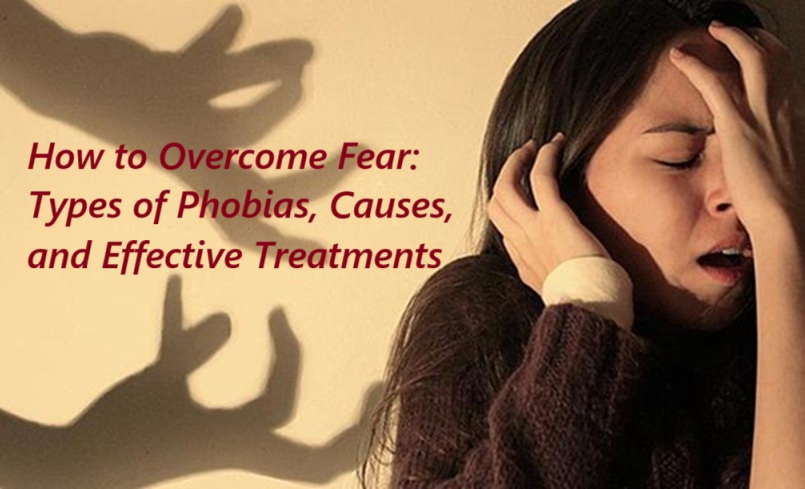How to Overcome Fear?
I am not a psychologist, but observing how both children and adults are afraid of certain things, I became curious about how to overcome fear. In my childhood, I was afraid of the “bogeyman,” because adults used it to scare me so that I wouldn’t go far from home. That is why I turned to psychologists, who kindly agreed to provide the information published below for my blog. I am sincerely grateful to them.
There are countless approaches to overcoming fear. The speed and effectiveness of therapy depend on the patient’s psyche and the type of phobia. The following treatment methods are the most popular.
Contents of the article:
-
What is a phobia?
-
Arachnophobia: fear of spiders
-
Ophidiophobia: fear of snakes
-
How to overcome fear of heights
-
Baldness — the fiercest enemy of men
-
How to overcome fear of an active lifestyle — is active sport useful for men?
-
Impotence
-
How to overcome fear of old age?
-
Male menopause
First Method
In the first case, the patient is exposed to the object of fear to help him deal with the phobia. One variation of this treatment is modeling a situation in which the patient is left face-to-face with the object of fear without the possibility of escape. The goal of this method is to convince the person that the feared object cannot actually harm them.
Second Method
Another method, called the method of counteraction, is often used to treat phobias. In this case, the patient is taught an opposite reaction to the object of fear. Instead of panicking, the patient applies relaxation techniques to avoid the previous anxious response. This method is used when the patient refuses the first type of treatment.
What is a Phobia?
A phobia is an excessive fear of an object or situation. Symptoms may occur not only when encountering the object directly, but even when merely thinking about it.
Symptoms include dizziness, nausea, shortness of breath, fear of death, or a feeling of unreality. Knowing the origin of a phobia helps in choosing the right treatment.
Psychologists distinguish three types of phobias:
-
Social phobias — fear of social situations.
-
Agoraphobia — fear of being trapped.
-
Specific phobias — fear of a concrete object (e.g., spiders).
Specific phobias are further divided into:
-
Natural environment (storms, water).
-
Animals (rodents, snakes).
-
Medical fears (blood, visiting doctors).
-
Situational (driving, bridges).
About 10% of the population suffers from phobias, and most people are aware their fears are irrational. Lifelong phobias remain only in about 10% of those who seek treatment.
Arachnophobia: Fear of Spiders
In some cases, it is enough to see just an outline resembling a spider to trigger fear. Causes include:
-
Their appearance is very different from humans.
-
They can approach silently.
-
They may be dangerous.
-
Fear is inherited from parents.
Treatment often involves direct exposure — allowing the patient to safely interact with spiders. Although strange to some, results are impressive: many cured people even keep spiders as pets.
Ophidiophobia: Fear of Snakes
Ophidiophobia is an irrational, panic-like fear of snakes. Researchers suggest it has evolutionary roots.
Common causes:
-
Being intentionally scared with a snake.
-
Unexpected encounters or snakebites.
-
Fear instilled by parents.
-
Religious teachings linking snakes with evil.
-
Movies and media depictions.
Even seeing snakes on TV can provoke panic. Over time, fear extends to anything associated with snakes. Effective treatments include hypnotherapy and NLP.
Fear of Heights
Acrophobia is a panic fear of heights. Some experts believe it is an evolutionary adaptation to avoid falls.
The intensity varies. True phobia occurs when the fear seriously disrupts life — some sufferers fear even climbing stairs. It is linked to vestibular system dysfunction and visual overload. Therapy targeting balance is recommended.
Fear of Baldness — the Fiercest Enemy of Men
Millions of men fear baldness. Androgenetic alopecia can appear at any age, beginning with hair thinning and ending in bald spots.
The main culprit is dihydrotestosterone, a hormone affecting sebaceous glands. Men produce much more of it than women, making them more prone to baldness. Stress, poor ecology, and genetics worsen the problem.
Modern medicine offers many treatments, but patience is required. Consultation with specialists is important. Folk remedies may help too.
Fear of an Active Lifestyle — Is Sport Good for Men?
Many men avoid physical activity, fearing discomfort. But is sport always good? Researchers at Pennsylvania University discovered that endurance training may reduce testosterone by 60–80%, lowering libido.
However, low testosterone may also increase protective lipoproteins, preventing cardiovascular disease. Moderate, not excessive, physical activity is best.
Impotence
Impotence (erectile dysfunction) is widespread. It includes premature ejaculation, weak erections, low libido, and infertility.
Causes can be somatic, neurological, urological, or psychological. The main problem often lies in nervous system disorders or prostate disease.
A common misconception is that sexual activity should be reduced — in fact, this worsens impotence. Modern treatments (drugs, psychotherapy, physiotherapy) restore potency in up to 95% of cases.
Fear of Old Age
Gray hair is natural, but many fear aging. Early graying is linked to stress, lack of nutrients, and poor ecology. Blondes gray earlier than brunettes.
Ways to slow graying:
-
Zinc and iron-rich foods.
-
Avoid stress.
-
Herbal hair rinses (e.g., nettle).
-
Melanin-stimulating creams.
Historically, wigs and powders masked gray hair. Today it is considered a sign of wisdom — but many still dye it.
Male Menopause
Between ages 40–60, men experience changes in sexual glands, often accompanied by psychological disorders and fear. Symptoms include hot flashes, dizziness, high blood pressure, palpitations, and reduced libido.
Treatment includes psychotherapy, hormone therapy, and vitamins. Lifestyle changes (exercise, fresh air) are recommended. Medical supervision is essential.







